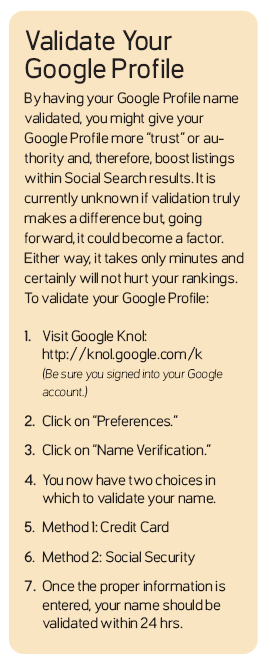SEO for Google Social Search

Search engine optimization (SEO) campaigns have moved far beyond simply optimizing
Now that Google "universal" or "blended" search has become widespread on almost every search query, a standard organic listing is competing with images, video, news, local, paid and real-time search. Now we can add social search results to the mix. These new sets of results not only deliver content that might have otherwise gone unnoticed, but also have the potential to push other, organic listings off the visible page. That means social media optimization (SMO) is now in direct competition with SEO. However, don't be discouraged. The good news is that it's often much easier to get top rankings for a blended or social search category than a highly competitive organic listing. That is, of course, if you understand how to optimize for Google Social Search.
Understanding Google Social Search
It's important to differentiate Social Search from Google's realtime search results. Real-time results are labeled "Latest results for ..." and include a scrolling results box for some queries. Alternatively, Google Social Search is labeled "Results from people in your social circle for ..." and results appear with an accompanying image (or avatar) from your social circle.
Think of Social Search as Google "Trust" Search. By personally choosing to "follow" certain friends and websites online, Google assumes that information from these sources is important, relevant and trusted by you and uses these contacts to form your social graph. Then, particular queries will return results from those in your circle - their blog posts, Twitter updates, etc. Google feels this can add yet another layer to search results and improve your overall search experience.
How does Google Determine Relevancy for Social Search?
Google claims to use a normal ranking algorithm when determining what websites to display first in Social Search results. So, page content, number of incoming links, and incoming link quality and authority are the primary ranking factors. However, expect this to change as Google continues to test and tweak Social Search results and puts more emphasis on the Direct and Secondary connections within your social circle. 
Optimizing for Google Social Search
First and foremost, you must have a Google Profile that includes information about you, and links to websites you want to promote. This should include links to your primary website and its weblog, and social profile URL's including Twitter, Facebook, MySpace, LinkedIn, YouTube, Flickr, Picasa, FriendFeed, Yelp, etc. In short, any active social network profile should be included. While some networks and their content will not be indexed by Google (such as Facebook), linking those profiles to your Google profile (and vice-versa) will offer a better chance of connecting with people through Google and, ultimately, be found in Social Search results.
Establish Connections within Gmail and Google Chat
While time consuming, it is worth gathering as many Gmail and/or Google Chat contacts as possible, as it will increase your exposure in Social Search. Unfortunately, contacts from other networks are not as easily imported. You can't add Twitter followers easily - they must be added one-byone. But you can import contacts from a CSV file, for example. Remember, not only will your contacts see you in their Social Search results, but you have the potential to be seen by the connections-of-your-connections or friends-offriends. In short, your reach will grow exponentially as you add connections.
Keep Content Relevant and High-Quality
Aggressively pursuing new contacts is important to Social Search success. However, you want to stay relevant and post quality content. Posting low-quality, keyword-stuffed content will result in the same fate as usual - low conversion rates. Or, in this case, you might find yourself banned from your contacts' Social Search results. Remember, these results are targeted to friends and trusted contacts. So, you want to appear as genuine and trustworthy as possible.
Social Search is Here to Stay
With the explosion of Facebook and Twitter you can no longer ignore the enormous potential in being social. Google wants its share of the social pie, so don't expect them to remain idle while Facebook and Twitter try to eat into their search market share. However, it is important to keep in mind that Google will continue to test and tweak results. Not every query will result in Social Search results, and you can expect many changes on the results pages and to the social ranking algorithm in the future. In the interim, get ahead of the game by optimizing your Google Profile for Social Search while competition is fairly low. It will benefit your overall social media and SEO efforts.









